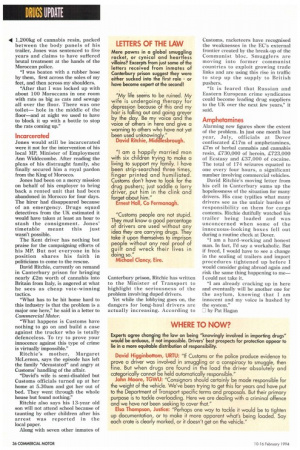In December CM highlighted the case of driver John Barber,
Page 36

Page 37

Page 38

If you've noticed an error in this article please click here to report it so we can fix it.
locked up in a French prison accused of having drugs on his truck. He has now been freed without charge and without his truck. And as CM has discovered, there are many other drivers who have suffered the same fate, many in UK prisons. One story, perhaps above all others, demonstrates how truck drivers fooled into smuggling drugs walk a fine line between good citizen and ruthless criminal. It's not hearsay and it's not a tale recounted by a resentful victim.
This one comes from Customs and Excise and was published in a recent report extolling the virtues of its fight against narcotics couriers: "A lorry driver advised Customs of his suspicions about the load of marble furniture he had just picked up on the Continent. It seemed abnormally heavy!
"The consignment was identified at Felixstowe and some 240kg of cannabis was found to be concealed within the furniture.
"The consignment was allowed to proceed and on arrest, three members of the smuggling team admitted six previous trips." For Customs, this episode represented another important victory in the battle against drugs barons. For British truck drivers, it highlighted once more their exposure to prosecution under UK and European laws for offences they may not have committed. The hero of the Felixstowe case could just as easily have been labelled a dangerous felon.
That's the dilemma which John Barber has been struggling to come to terms with since his release from a decaying, overcrowded French prison shortly after Christmas.
He fell on the wrong side of the law when he was charged with smuggling £750,000 worth of cannabis from Spain into France last September and spent more than three months in jail while the authorities analysed the evidence.
When an Examining Magistrate finally ruled he had no case to answer he thought the nightmare was over. But freedom for Barber means no truck because French Customs won't release his £12,000 unit, no business and no money. He suffers persistent headaches, is a stone-and-a-half lighter than when he was arrested and is beginning to wonder if he should seek counselling.
"My best friend says my whole mental attitude has changed. I'm not used to big open spaces and I haven't even been outside yet because I don't fancy seeing anyone.
"When you're in a confined space 15ft long by 7ft wide, 23 hours a day, it does your head in. Now I'm sleeping on a double bed, it's like sleeping in the middle of a bloody field."
Wounds
Although time may help heal the psychological wounds, Barber's commitment to haulage is clearly being destroyed by the anger he feels for the real culprits and the failure of the system to protect his rights. He is adamant his driving career is finished.
"I'm not going to drive another truck ever again. I'm just not interested. There's no protection for me or any other driver. I wouldn't advise anyone to go abroad again until something is done about it."
Barber's tale, highlighted in Commercial Motor in December, was one of deprivation and degradation. An experienced Continental operator, he was clearly taken aback at the conditions in his cell in Bayonne, south-west France.
Yet if fellow long-haul specialist John Jones of Kent is right, Bayonne prison had all the palatial trappings of a Hollywood mansion compared to the horror of the jail in Morocco where he spent 22 months.
Convicted of transporting a massive ■ -411 1,200kg of cannabis resin, packed between the body panels of his trailer, Jones was sentenced to five years and claims to have suffered brutal treatment at the hands of the Moroccan police.
"I was beaten with a rubber hose by them, first across the soles of my feet, and then across my shoulders.
"After that I was locked up with about 100 Moroccans in one room with rats as big as cats and sewage all over the floor. There was one toilet-hole in the middle of the floor—and at night we used to have to block it up with a bottle to stop the rats coming up."
Incarcerated
Jones would still be incarcerated were it not for the intervention of his local NIP, Minister of Employment Ann Widdecombe. After reading the pleas of his distraught family, she finally secured him a royal pardon from the King of Morocco.
Jones had been on a mercy mission on behalf of his employer to bring back a rented unit that had been abandoned in Morocco for four days. The hirer had disappeared because of an emergency. Drugs squad detectives from the UK estimated it would have taken at least an hour to stash the consignment. Jones' timetable meant this just wasn't possible.
The Kent driver has nothing but praise for the campaigning efforts of his MP. But not everyone in his position shares his faith in politicians to come to the rescue.
David Ritchie, currently on remand in Canterbury prison for bringing nearly £2m worth of cannabis into Britain from Italy, is angered at what he sees as cheap vote-winning tactics.
"What has to be hit home hard to this industry is that the problem is a major one here," he said in a letter to Commercial Motor.
"What happens is Customs have nothing to go on and build a case against the trucker who is totally defenceless. To try to prove your innocence against this type of crime is virtually impossible."
Ritchie's mother, Margaret McLernon, says the episode has left the family "devastated" and angry at Customs' handling of the affair.
"David's wife is semi-disabled but Customs officials turned up at her home at 5.30am and got her out of bed. They went through the whole house but found nothing."
Ritchie also says his 13-year old son will not attend school because of taunting by other children after his arrest was reported in the local paper.
Along with seven other inmates of Canterbury prison, Ritchie has written to the Minister of Transport to highlight the seriousness of the problem involving duped drivers.
Yet while the lobbying goes on, the dangers for long-haul drivers are actually increasing. According to Customs, racketeers have recognised the weaknesses in the EC's external frontier created by the break-up of the Communist bloc. Smugglers are moving into former communist countries to exploit growing trade links and are using this rise in traffic to step up the supply to British pushers.
"It is feared that Russian and Eastern European crime syndicates could become leading drug suppliers to the UK over the next few years," it said.
Amphetamines Alarming new figures show the extent of the problem. In just one month last year, July, officials at Dover confiscated 117m of amphetamines, ,C7m of herbal cannabis and cannabis resin, £730,000 of heroin, £723,000 of Ecstasy and £37,000 of cocaine. The total of 174 seizures equated to one every four hours, a significant number involving commercial vehicles.
David Ritchie's moving letter from his cell in Canterbury sums up the hopelessness of the situation for many drivers. His case typifies what many drivers see as the unfair burden of responsibility on them for cargo contents. Ritchie dutifully watched his trailer being loaded and was unconcerned when some of the innocuous-looking boxes fell out during a routine check at Dover.
"I am a hard-working and honest man. In fact, I'd say a workaholic. But if freed, I would have to see a change in the sealing of trailers and import procedures tightened up before I would consider going abroad again and risk the same thing happening to mei could not take it.
"I am already cracking up in here and eventually will be another one for the asylum, knowing that I am innocent and my voice is hushed by the system."
by Pat Hagan




















































































